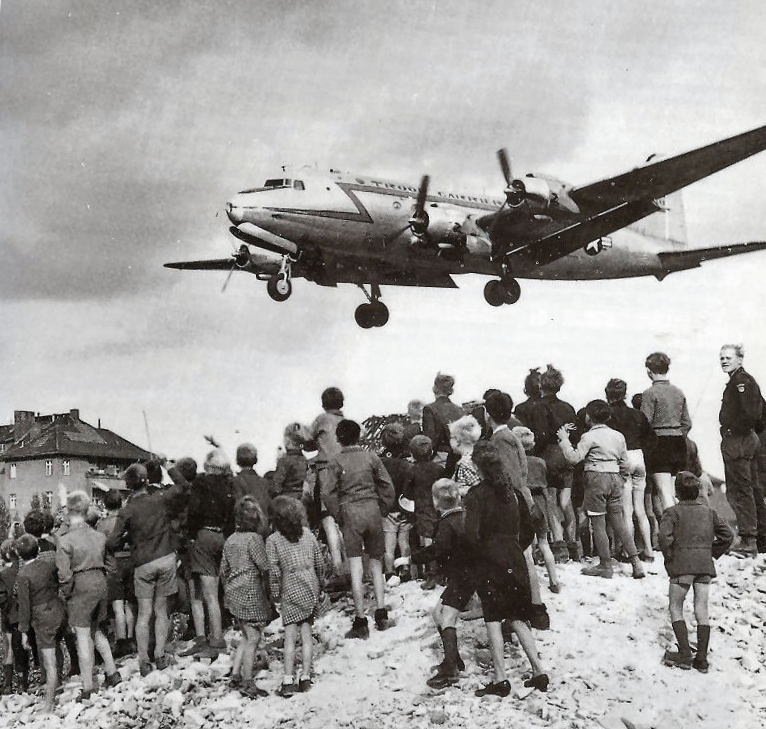It happened today - June 26, 2015
 On June 26 of 1948 the Western Allies began one of the most significant, improbable and slow-moving victories in the entire Cold War: the airlift that broke Stalin’s Berlin Blockade. It was patient, shrewd, determined and showed the awesome economic power of freedom.
On June 26 of 1948 the Western Allies began one of the most significant, improbable and slow-moving victories in the entire Cold War: the airlift that broke Stalin’s Berlin Blockade. It was patient, shrewd, determined and showed the awesome economic power of freedom.
The rather complicated background hinges on the total breakdown of cooperation over conquered Germany. When the U.S., Britain and France decided to allow the economic recovery what would become West Germany the Soviets duplicitously cut off all land and water access to the Western occupation zones in Berlin, the city being divided into four zones like the whole of Germany but entirely inside the Soviet zone of Germany proper.
The blockade was especially awkward for the Americans because they had basically disarmed after World War II. I remember when I was in university including grad school there was this strong “revisionist” line of thought that the U.S. had basically caused the Cold War, even wanted it, had failed to accommodate Stalin’s legitimate security concerns in Eastern Europe (as if Stalin had or could have any legitimate concerns about anything), had used “atomic diplomacy” to frighten the Bolsheviks and so on.
I always thought it an odd argument since the Soviets gave no sign of being intimidated. And I thought it very odd that the U.S. would have sought to throw its weight around by reducing its forces in Europe to 12 ill-equipped divisions whose battle plan in the event of a Soviet attack was to flee to the French-Spanish border and wait for help, and to practice “atomic diplomacy” without building nuclear weapons. But as late as the summer of 1948 the U.S. had very few atomic bombs and no bombers in Europe capable of dropping one.
For an aggressor, the U.S. sure hadn’t given itself many options. But Washington had one small thing going for it. The Soviets had expressly promised to allow access to Berlin by air. So despite having limited aircraft on hand the Americans determined to launch “Operation Vittles” and somehow bring in not just the food but the incredibly bulky and heavy coal needed by inhabitants of what would later become West Berlin.
I like the name “Operation Vittles”. I don’t entirely approve of the general American habit of giving military operations grandiose names and this one has a homespun quality I appreciate. But I like the strategic thinking even more.
To try to resupply Berlin by ground risked humiliating confrontation. The Soviets, who had never promised land access anyway, had already turned back a train and it was easy to declare a highway closed, or simply block a truck convoy, and leave the West the unpalatable choice of starting shooting in the Soviet zone or slink away. But flying in supplies put the onus on the Soviets to escalate, radically and very publicly (you can’t stop a plane in midair for inspection), or stand back and see if they could pull it off.
They chose the latter, partly because it seemed almost certain that it was logistically impossible. And here’s what I find most impressive. The Americans had calculated that they would need to deliver some 5,000 tons of supplies per day (around 1,500 of food and 3,500 of gas and coal) each and every day. And by golly they did.
The Allies, mostly the Americans, managed to supply Berlin by air for more than a year. In fact even after the Soviets lifted the blockade on May 12 1949 they kept it up for a while just to poke Stalin in the eye logistically and say ha ha we’re not even tired (and to build stockpiles in case the Soviets reimposed the blockade). And by the time it officially ended on September 30 of 1949 the U.S. Air Force had delivered 1.78 million tons of supplies, and the RAF more than half a million tons more (the Australians also chipped in, in a smaller way). In total the supply planes flew over 92 million miles, almost the distance from Earth to the Sun, and at the height of the airlift a plane reached West Berlin every 30 seconds.
The Berlin Blockade was a fairly unusual demonstration of Western cleverness in the conduct of international affairs as well as of determination and clarity. But it was also based on the astounding productivity of free societies that give them considerable leeway when it comes to strategic thought because they are so resourceful and resilient when they do put their minds to something.
It’s not an argument for carelessness, of course. But it is a vindication of liberty.